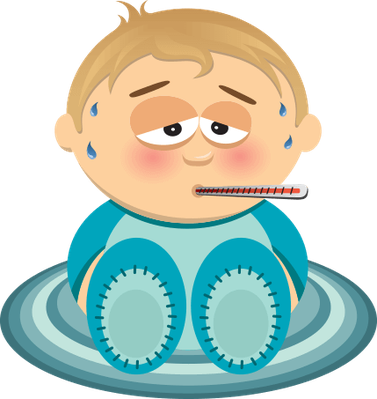Imagine yourself in the following situation: It’s Friday night, your child has been fussier than usual this evening, and all of a sudden he feels hot. You rummage through the medicine cabinet trying to find your thermometer, and when you’re finally able to wrestle him down and take the temperature, it’s 102.5! Now you’re stuck – your son has a fever, and it’s Friday night. What should you do, and when should you be worried?
Scenarios like the above are very common reasons for visits and calls to our office. Fever is a symptom defined as an elevation in the core body temperature above normal, or a temperature of greater than 100.4 F (38 C). Fever is a result of the body’s immune system activating to fight off an infection, and it is a sign that your child’s immune system is functioning appropriately.
Viral infections are the most common reason for fever in a child. There are thousands of viruses and they cause a myriad of symptoms, including runny nose, cough, sore throat, vomiting, or diarrhea. Bacterial infections like ear infections, pneumonia, or a urinary tract infection can also present with fever. It’s important that a child with fever be evaluated by a pediatrician so that we can examine the child and determine what the source of infection is. It’s a good idea to call and make an appointment the same day of a fever, particularly if your child has symptoms of sore throat, abdominal pain, or ear pain.
If the fever appears at a time when clinic is closed, don’t worry! Fevers always seem to come at the most inconvenient times. Please refer to the following guidelines:
-If your child is under 3 months old: Please call us immediately if your child has a temperature above 100.4 F (38 C). The temperature should be taken rectally (insert the tip of the thermometer just inside the rectum and hold in place).
-If your child is above 3 months old: Please call immediately if your child is not able to drink or has decreased urination, if your child is acting lethargic or not responding to you normally, or if the temperature is greater than 105 F. The simplest and most accurate way to measure a temperature in this age group is axillary, or under the armpit. Place the thermometer in the armpit and hold tightly until complete. If your child is old enough to cooperate you may also take an oral temperature by placing the thermometer under the tongue. Most forehead thermometers are less accurate and should be confirmed with an axillary or oral temperature. You may give Tylenol (acetaminophen) every 6 hours for fever and the temperature should improve. You can also give Motrin (ibuprofen) every 6 hours for fever if your child is above 6 months of age. If your child is acting normally, drinking and urinating normally, and temperature improves with Tylenol or Motrin, it is okay to wait until the morning to call the office for an appointment.

